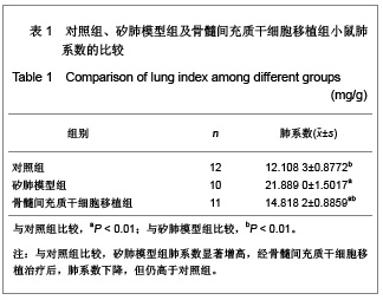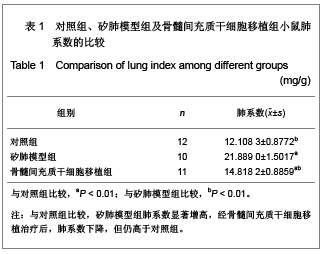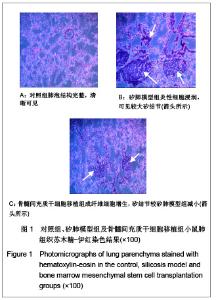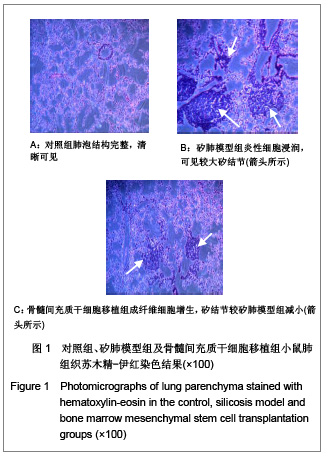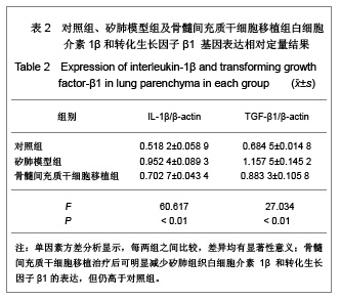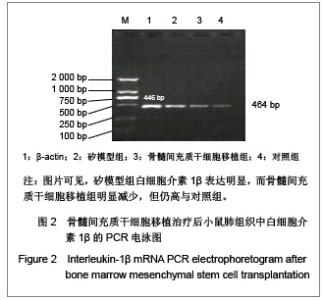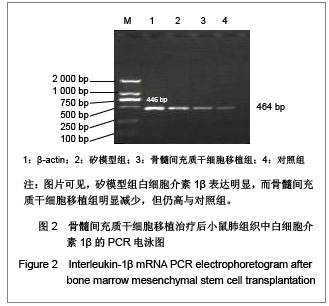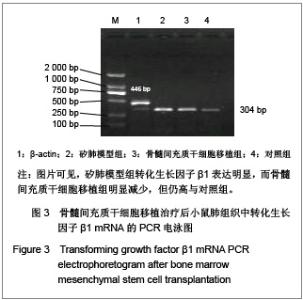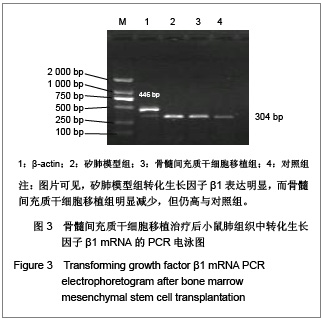| [1] Chen J, Niu Q. Beijing:The Publishing House of People’s Health. 2007:179-191. 陈杰,牛侨.生产性粉尘与尘肺.职业卫生与职业医学[M].6版.北京:人民卫生出版社,2007:179-191.[2] Greenberg MI, Waksman J, Curtis J. Silicosis: a review. Dis Mon.2007;53(8):394-416.[3] Giordano G, van den Brûle S, Lo Re S,et al. Type I interferon signaling contributes to chronic inflammation in a murine model of silicosis.Toxicol Sci.2010;116(2):682-692.[4] Hoffman HM, Wanderer AA, Hal M, et al.Inflammasome and IL-1β-Mediated Disorders.Curr Allergy Asthma Rep.2010; 10(4):229-235.[5] Faffe DS, Silva GH, Kurtz PM , et al.Lung tissue mechanics and extracellular matrix composition in a murine model of silicosis.J Appl Physiol.2001;90(4):1400-1406.[6] The Ministry of Science and Technology of the People’s Republic of China. Guidance Suggestions for the Care and Use of Laboratory Animals. 2006-09-30.[7] Maron-Gutierrez T, Castiglione RC, Xisto DG,et al.Bone marrow-derived mononuclear cell therapy attenuates silica-induced lung fibros. European Respiratory Society. 2011;37(5):1217-1225. [8] Xiang JJ, Sun JY, Deng N, et al. ZHongguo Bingli Shengli Zazhi. 2004;20(4):647-650. 向军俭,孙佳寅,邓宁,等.小鼠矽肺模型的建立及bFGF参与矽肺形成的研究[J].中国病理生理杂志,2004,20(4):647-650.[9] Li D, Xiang JJ, Wang H,et al. Gongye Weisheng yu Zhiyebing. 2011;37(2):74-77. 李丹,向军俭,王宏,等.染矽尘小鼠早期肺组织bFGF与FGFR-1的表达及意义[J].工业卫生与职业病,2011,37(2):74-77.[10] van den Brûle S, Misson P, Bühling F, et al.Over expression of cathepsin K during silica-induced lung fibrosis and control by TGF-β.Respiratory Research. 2005;6:84.[11] Anjos-Afonso F, Siapati EK, Bonnet D.In vivo contribute of murine mesenchymal stem cells into multiple cell types under minimal damage conditions.Cell Science.2004;117(23): 5655-5664.[12] Bianco P, Robey PG, Simmons PJ. Mesenchymal Stem Cells:Revisiting History,Concepts,and Assays.Cell stem cell. 2008;2(4):313-319.[13] Krause DS, Theise ND, Collector MI, et al. Multi-organ, multi-lineage engraftment by a single bone marrow-derived stem cell. Cell. 2001;105:369-377.[14] Okamoto M, Dohi Y, Ohgushi H, et al.In?uence of the porosity of hydroxyapatite ceramics on in vitro and in vivo bone formation by cultured rat bone marrow stromal cells. Mater Med.2006;17(4):327-336.[15] Burt RK,Kozak T.Hematopoietic stem cell transplantation for multiple sclerosis:finding equipoise.Bone Marrow Transplantation.2003;32(Suppl 1):45-48.[16] Srivastava KD, Rom WN, Jagirdar J, et al. Crucial role of interleukin-1beta and nitric oxide synthase in silica-induced inflammation and apoptosis in mice. Am J Respir Crit Care Med.2002;165(4):527-533.[17] Ramsgaard L, Englert JM, Tobolewski J,et al.The Role of the Receptor for Advanced Glycation End-Products in a Murine Model of Silicosis.PloS One.2010;5(3):e9604.[18] Lassance RM, Prota LF, Maron-Gutierrez T, et al.Intratracheal instillation of bone marrow-derived cell in an experimental model of silicosis.Respiratory Physiology & Neurobiology. 2009;169(3):227-233. [19] Rojas M, Xu J, Woods CR, et al.Bone Marrow–Derived Mesenchymal Stem Cells in Repair of the Injured Lung.Am J Respir Cell Mol biol. 2005;33(2):145-152.[20] Lee SH, Jang AS, Kim YE, et al. Modulation of cytokine and nitric oxide by mesenchymal stem cell transfer in lung injury/fibrosis.Respir Res. 2010;11(1):16-18.[21] Ortiz LA, Gambelli F, McBride C, et al.Mesenchymal stem cell engraftment in lung is enhanced in response to bleomycin exposure and ameliorates its fibrotic effects. Proc Natl Acad Sci USA .2003;100(14):8407-8411. |
